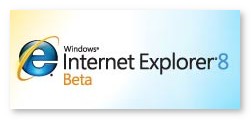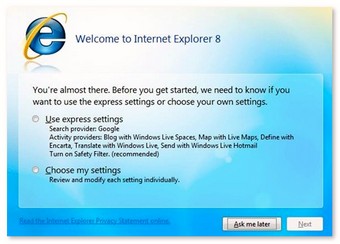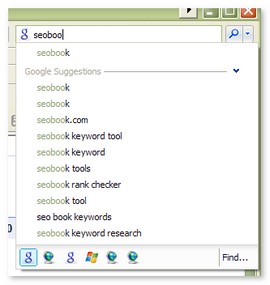I've been trying out Google's Chrome browser. I like it. I really do.
I like Chrome mainly because it is fast. Faster than Firefox, anyway. However, I'll be alternating between the two browsers, because Firefox has a plethora of useful plug-ins that Chrome lacks.
Like many Firefox converts, I haven't looked at Internet Explorer for some time now.
Microsoft have recently released IE8, so I thought I'd evaluate it in terms of search, and contrast it with the functionality and positioning of Chrome. Many in the internet community have speculated that Chrome is going to eat Microsoft's lunch, and not just in the browser space, but with the ushering in of cloud computing. Is this plausible?
Let's take a look.

You can download IE8 Beta from here. As usual, you'll have to sign your soul, and those of your yet unborn children, etc, etc over to Microsoft, and then reboot.
Goodbye Google Toolbar
You run through the inevitable setup screens. The first search-related issue I noticed was that Google's toolbar wasn't compatible with IE8 beta, and asks me if I want to disable it. Is a bug, feature, or a market position? ;)
Next up, IE8 asks you if you want to use "Express Settings", which means that the search provider will default to your existing default, and just about everything else defaults to Microsoft products or services. Internet Explorer also wants to become your default browser. At this point, you can opt for Custom Settings, and modify each setting individually.

Pretty flexible, really. If you want to opt out of Microsoft services, you can do so easily.
The Search Wars
My main reason for looking at IE8 is in terms of search. What functionalities do you get, and how is this browser positioned against Google?
Search Suggestion
One feature, called Search Suggestions, offers, naturally enough, search suggestions. Like the equivalent Google feature, IE8 will try to guess what keyword you are search for a prompt you with suggestions as you type. This feature works with many different search providers (Google, Yahoo!, Live) and large ecommerce and content sites (Amazon.com, eBay, Wikipedia), which makes the search box a nice keyword research tool, but nothing new to most of us, I'm sure.
Note that this type-ahead feature, like on all browsers offering type-ahead suggestions, will send your search queries to your search provider, even if you don't hit send. Matt Cutts, perhaps sensitive to the privacy concerns aimed at Google, makes the point in this comment he posted on GoogleBlogoscoped that " if "Suggested Sites" is on, "your web browsing history is sent to Microsoft, .... the addresses of websites you visit are sent to Microsoft, together with some standard information from your computer such as IP address, browser type, regional and language settings.....".

How Will This Affect SEO?
An aspect SEOs need to consider is how the widespread implementation of search suggest is going to affect SEO. In this post, Aaron talks about how search suggest is likely to force a consolidation around the most popular terms. This has implications for those going after the long tail, but also provides new SEO opportunities, especially if you have a brand that incorporates popular search terms.
Explorer also allows search suggestion from any provider, which can be a useful SEO tool, in itself.
Visual Search
IE8 also offer Visual Search, which provides pictures to help you select a result. This didn't seem to work for me, but I did notice that a search on "Seattle Weather", the search term suggested by Microsoft, did bring up a page featuring advertisements for Australian outdoor sportswear suppliers. Reminds me how far other providers have to go in this text ad space in order to catch up with Google. It wasn't until I dug around a bit further that I discovered that you need to install search providers. Even then, it wasn't playing well, giving me a string of error messages.
Still, problems are to be expected in a beta release.
Other improvements include search history matching, a useful "Find On Page" button added to the instant search box, and the ability to drag the search box in order to change the width. A few nice touches.
Forced Search Provider?
On the Microsoft global-domination conspiracy front, far from locking you in, Microsoft have made it rather easy to configure IE8 to incorporate your choice of search provider. It wants to default to Live Search, but you can easily select Google, or other services. The pull-down search box provides options to add more. So, good marks in terms of flexibility.
There are various other features, including InPrivate browsing, which supposedly blocks ads and prevents people tracking you across the web. As it isn't search related, I won't review it, other than to say it is good that the user has to jump through a few hoops to enable it. Love 'em or hate 'em, web ads enable the production of a lot of "free" web content. If ads were turned off by default, many sites would simply cease to exist, or start charging for content. Full marks to Microsoft for leaving this option to the power users.
IE8 Vs Chrome
Now, contrast these features with Google's Chrome.
Did you find Chrome noticeably faster than your existing browser, be it Firefox or IE?
I did.
Speed was the deciding factor for me. On the internet, speed is (nearly) everything. IE8 didn't strike me as being any faster than Firefox, and certainly a lot slower than Chrome.
In this respect, IE8 feels like an update to an existing product, as opposed to a game changer. Chrome feels like a game-changer, even though, when pushed, I can't put my finger on exactly why this is. I think it may come down to the usability gains of extra speed, especially if your day to day use orients a search function. IE8 is adding functions, desktop application-stylee, while Google is busy taking features out in order to simplify and minimize.
If cloud computing is to take off, then the browser is going to need to need the speed of an application, and it is going to need to be simple and transparent in order for people to bother migrating.
Application-Centric Vs Web Centric
Chrome explains itself better. The Google information pages tell a cohesive story, whilst Microsoft's story appears scattered and a little confused. I'd liken Chrome to an Ipod. It lacks features some users might demand, but it works right out of the box for most people. Microsoft IE8 is, well....Microsoft. It feels more application centric.
Perhaps that says something about the web strategy of the respective companies. Google wants to pull users out of their existing habits, and into the Google web, whilst Microsoft needs to integrate existing application users with the web.
A subtle difference, but there nonetheless.
Have Your Say
What are your thoughts? Have you tried both new browsers?


